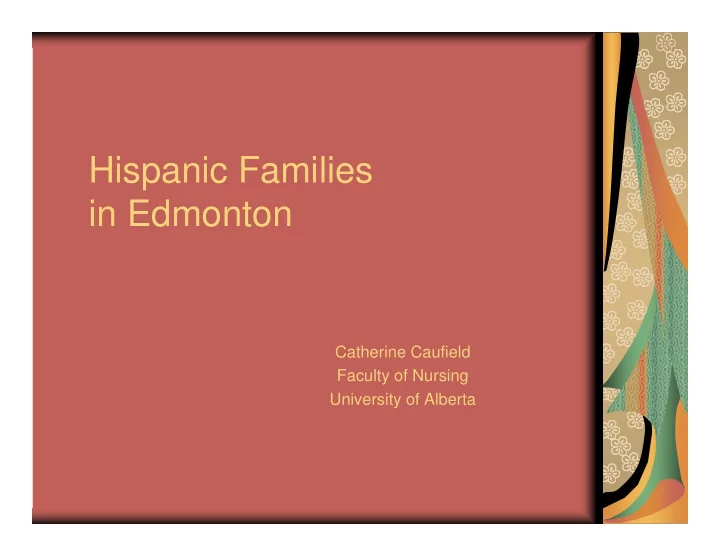

Hispanic Families in Edmonton Catherine Caufield Faculty of Nursing University of Alberta
Hispanics (2001 Census) � 22,300 people born in Central and South America (Mexico included) are living in Alberta � 7,825 people born in Central and South America and 170 Spanish live in Edmonton � About 9% of the population of Edmonton is Hispanic
Hispanic Families in Edmonton Project goals: � Determine resources available to Hispanic families � Assess how accessible these resources are � Assess the extent to which they are used � Find relationships between experiences and policies � How does policy play out on the ground � Give a voice to this community: what do they want to say, what would they like to see happen
Hispanic Families in Edmonton Theoretical aspects: hermeneutics � Representation theory (Ricoeur/Aristotle, Spivak) � Theories on the interpretation of oral data/discourse analysis (Ricoeur, Austin, Searle)
Hispanic Families in Edmonton Method � Recruit four women, with their partners if possible � Semi-structured interviews, recorded, transcribed, content analysis � Create a narrative of their pre-immigration, immigration, and post-immigration experience
Hispanic Families in Edmonton � Dialectical exchange between myself (Caucasian, non-immigrant, academic) and four women (Hispanic, immigrant, non- academic) so that their emic immigration and settlement experiences and my etic research- oriented perspectives mesh and collide, agree and disagree, are similar and different and together we create an analysis of what is happening to these Hispanic families in Edmonton
Hispanic Families in Edmonton Recruitment � Snowball method � I do recruitment Select participants based on: � Different countries of origin, varied life experiences, varied ages � “Fit” of me and participants � Capacity and willingness to co-create and even co- author with me
Hispanic Families in Edmonton Dissemination � Academic articles � Stories in newspapers and magazines � Co-authored book � Ethics approval already obtained � Funding already obtained
Hispanic Families in Edmonton � Dearth of literature: underdeveloped � Difficulties in obtaining sample/participants • Decreased capacity to publish • Exclude from research or research is not done • Socio-political exclusion of community
Hispanic Families in Edmonton Participant barriers to participation: � Intrusive � Population that is overwhelmed, in survival mode: issues with immigration law, credential recognition issues, financial issues, marital stress, issues with children, etc. � Perceived uselessness of research (have participated before and no action taken, nothing has changed) � Wariness of State, don’t want trouble, just want to live own quiet lives Researcher barriers to obtaining participants: � I am not known, trusted in community � Tend only to be able to access more vulnerable populations
Hispanic Families in Edmonton � Compelling products of research • Education, knowledge mobilization in policymakers • Action in communities � Cultural benefits of diversity; creative class � Narrative approach provides access to cultural imaginary � Dialogical model provides potential to change way people think � How live together in global world: bi-lateral integration • framework: determinants of health • focus on methods: policies and programs that are helpful/not helpful
Recommend
More recommend